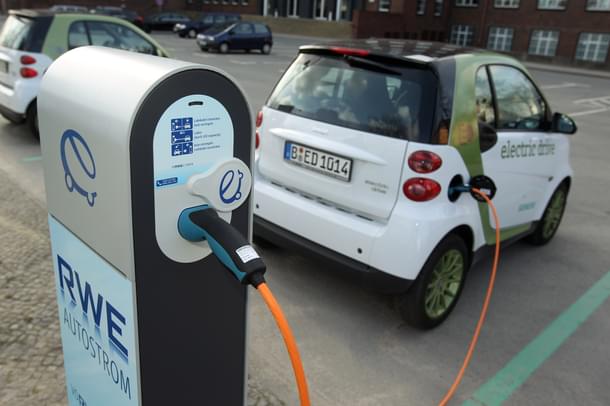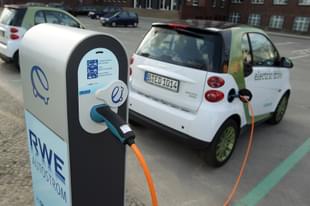Insta
Boosting E-Mobility: EESL To Set-Up Around 2,000 EV Charging Stations In FY21
IANS
Jun 06, 2020, 02:28 PM | Updated 02:28 PM IST
Save & read from anywhere!
Bookmark stories for easy access on any device or the Swarajya app.


Undeterred by Covid-19 outbreak power PSUs' joint venture EESL plans to ramp up installation of electric vehicle (EV) charging stations in the country during fiscal 2020-21.
The joint venture of PSUs under the Ministry of Power, the Energy Efficiency Services Limited (EESL) has undertaken the project to boost the e-mobility ecosystem in India.
Accordingly, the company plans to set-up around 2,000 EV charging facilities across the country during this fiscal.
At present, it has installed over 300 such charging stations in India.
However, some of them have not come online to supply side disruptions caused due to Covid-19 outbreak.
"We have resolved the supply side constraints. Most of the new charging stations will become operational soon," EESL Managing Director Saurabh Kumar told IANS.
"We have exceeded out target of EV charging stations for FY20. Now we have over 300 such charging stations across the country."
For FY21, Kumar pointed-out, that company plans to accelerate the installation process and targets to set-up 2,000 new EV charging stations.
"Our installation plans have not at all slowed down. In fact this year (FY21) we have set a target of 2,000 charging stations," Kumar said.
"With the supply side back on track we will be able to achieve this target."
In the Delhi-NCR region, EESL aims to install around 500 charging stations in the current fiscal.
Eventually, the company plans to set up 10,000 charging stations over the next two to three years across India.
Presently, the state-run firm has tied up with various private and public companies such as Apollo Hospitals, BSNL, Maha-Metro, BHEL and HPCL, among others, to set up public charging infrastructure.
It has also partnered with urban local bodies in cities like Hyderabad, Noida, Ahmedabad, Jaipur and Chennai, and is in discussion with others to erect s uch infrastructure.
One of the main capital requirements to set up charging infrastructure is the availability of ''land'', which as of now is provided free of cost by most municipal bodies or firms for public chargers to EESL.
Currently, many automobile companies and other private players, including standalone charging infrastructure developers, are also installing these facilities.
According to Kumar, one of the main capital requirements to set up charging infrastructure is the availability of ''land'', which as of now is provided free of cost by most municipal bodies or firms for public chargers to EESL.
The clean energy major then sets up the charging station in that area and op erates it for 10 years.
In return, EESL pays a certain proportion as land rental to the entity for every kilowatt hour (kW/h) the company utilises.
Furthermore, the company is in the process of aggregating the demand generation for EVs in the country via bulk purchases.
Apart from creating an e-mobility ecosystem in the country, EESL is scaling u p smart meters and smart grids, storage and other clean energy technologies.
It is also betting big on the development of ''trigeneration'' projects in India.
The ''trigeneration'' or ''combined cooling, heat and power'' project involves natural gas-fired generators to produce electricity.
In the process, the waste heat from fuel gas is recovered to produce steam, which is used for heating and also in absorption chillers for cooling.
Recently, the company entered into a MoU with natural gas major GAIL India for the development of such projects in India.





